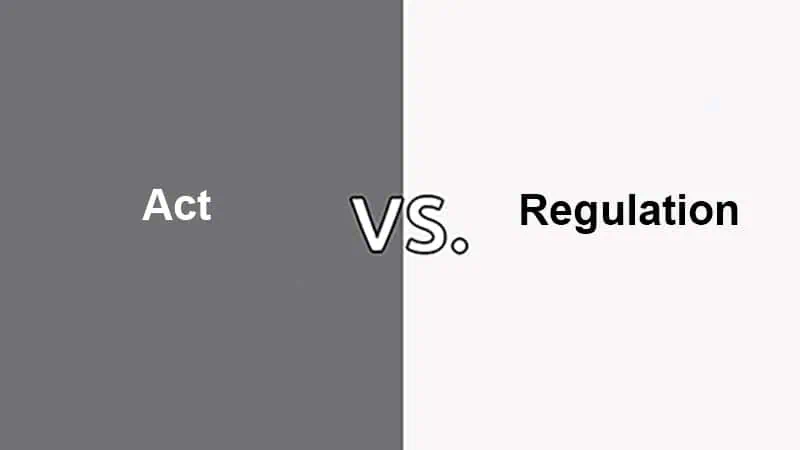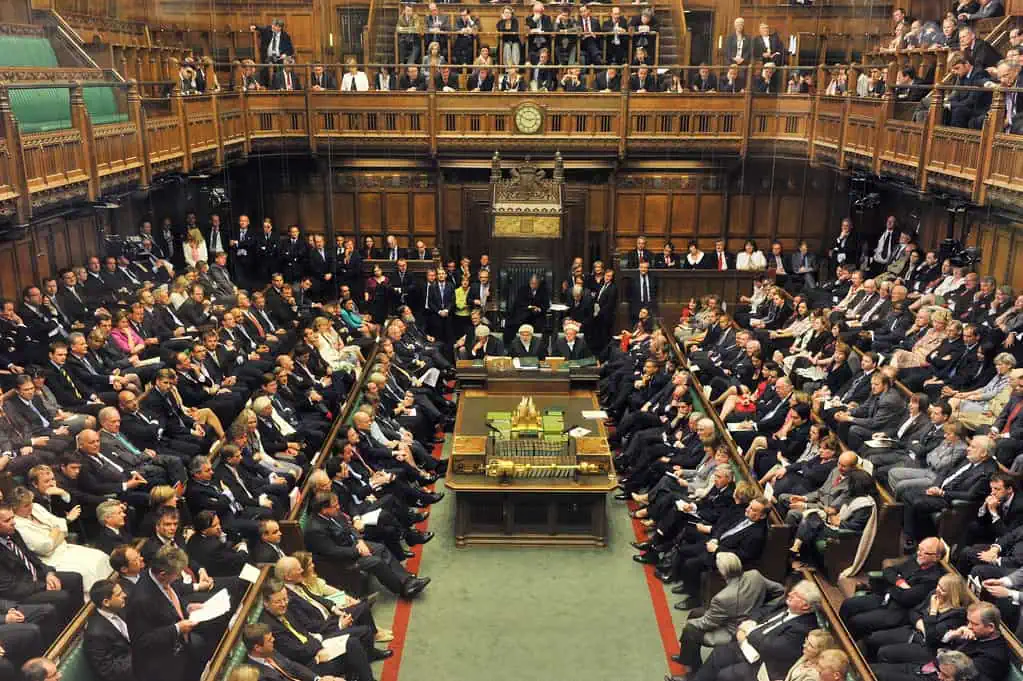Every country has its government bodies that pass the acts and create regulations. Each government body is responsible for the different types of rules and acts they passed for the betterment of the country. Every member of the country who lives there or visits that country needs to follow those rules or acts.
Act vs Regulation
An act is a primary piece of legislation passed by a legislative body. At the same time, a regulation is a subordinate or secondary legal instrument created to implement and provide detailed rules under an act. Acts lay down the broad legal framework, while regulations provide specific guidelines and rules for compliance.

In the eye of the law, an act is a bill that is commenced by the government. It is a legal mechanism that notes or inscribes something that has been said or done. It is a sub-set of law that makes the public aware of the rules that came into force by the members of parliament or the government. It becomes an act when the government bodies convey or proceed with the bill.
On the other hand, the regulation is an approved or official rule. It is the rules proposed by the parliament or the government bodies to control the behavior of the public. It also ensures the proper functions of the law. It provides the guidelines for the act that needs to be implemented.
Comparison Table Between Act and Regulation
| Parameters of comparison | Act | Regulation |
|---|---|---|
| Definition | Primary piece of legislation enacted by a legislative body, referred to as a statute. | Secondary legal instrument created to provide detailed rules and guidelines under an Act. |
| Authority | Holds higher legal authority and sets out the overarching legal framework for a particular area of law. | Derives authority from the corresponding Act and provides specific rules and procedures to implement the Act. |
| Scope | Broad and comprehensive, outlining general principles, rights, and obligations. | Narrow and specific, detailing procedures, standards, and specific requirements. |
| Creation | Created and enacted by a legislative body (e.g., parliament or congress). | Developed by government agencies or authorities responsible for administering and enforcing the law. |
| Modification | Typically requires a formal legislative process to amend or repeal. | Can be modified more easily through administrative procedures or delegated authority without the need for new legislation. |
| Examples | Examples include the Clean Air Act, the Patriot Act, and the Affordable Care Act. | Examples include building codes, environmental regulations, and food safety guidelines. |
| Hierarchy | Holds a higher legal hierarchy within the legal system. | Holds a lower legal hierarchy and derives authority from the corresponding Act. |
What is Act?
An Act, in the context of law and legislation, is a formal and binding piece of legislation or statutory law enacted by a legislative body, such as a parliament, congress, or other governing authority. Acts are also commonly referred to as statutes. They serve as the primary source of law in many legal systems and play a foundational role in shaping and governing society.

Key characteristics of an Act include:
- Legal Authority: Acts carry the highest legal authority within a legal system. They are the foundation of the legal framework and set forth the fundamental rules, principles, rights, and obligations in a specific area of law.
- Formal Enactment: Acts undergo a formal legislative process, including drafting, debate, and approval by the legislative body. This process ensures that laws are scrutinized, debated, and refined before becoming legally binding.
- Broad Scope: Acts are comprehensive and address overarching legal principles. They provide the framework within which regulations, rules, and administrative procedures are developed and implemented.
- Amendments and Repeals: Acts can be amended or repealed by subsequent legislation, but this requires a formal legislative process. Changes to Acts reflect evolving societal needs and values.
- Examples: Acts can cover a wide range of topics, from criminal law (e.g., the Criminal Code) to healthcare (e.g., the Affordable Care Act) and environmental protection (e.g., the Clean Air Act).
Acts are the cornerstone of legal systems, providing the legal basis for government operations, the protection of individual rights, and the regulation of various aspects of society. They serve as a reference point for legal professionals, policymakers, and citizens seeking to understand their rights and responsibilities under the law.
What is Regulation?
A regulation, in the context of law and governance, is a secondary or subordinate legal instrument that is created and authorized under the authority of a primary piece of legislation, referred to as an “Act” or “statute.” Regulations serve the crucial role of providing specific and detailed rules, guidelines, and procedures necessary for the implementation, enforcement, and administration of the broader legal framework established by an Act.
Key characteristics of regulations include:
- Derived Authority: Regulations derive legal authority from the corresponding Act, which sets out the overarching legal principles and objectives. They cannot exist independently and are subsidiary to Acts.
- Specificity: Regulations are highly specific and detailed, outlining the practical requirements, standards, and procedures that individuals, organizations, and government agencies must follow to comply with the Act.
- Creation: Regulations are created by government agencies, administrative bodies, or authorities responsible for overseeing and enforcing the law. They draw upon their expertise to translate legislative intent into practical rules.
- Flexibility: Regulations can be modified more easily than Acts. Amendments to regulations can be made through administrative procedures or delegated authority without new legislation, allowing for timely adjustments to evolving circumstances.
- Examples: Examples of regulations include building codes, environmental protection standards, workplace safety guidelines, and financial regulations issued by regulatory bodies like the Securities and Exchange Commission (SEC) in the United States.

Main Differences Between Act and Regulation
Act:
- Primary legislation enacted by a legislative body (e.g., parliament or congress).
- Carries higher legal authority and sets out the overarching legal framework for a particular area of law.
- Broad in scope, outlining general principles, rights, and obligations.
- Created through a formal legislative process, including drafting, debate, and approval.
- Amendments or repeals require a formal legislative process.
- Examples include the Clean Air Act, the Patriot Act, and the Affordable Care Act.
Regulation:
- Secondary or subordinate legal instrument created to provide detailed rules and guidelines under an Act.
- Derives authority from the corresponding Act and provides specific rules and procedures to implement the Act.
- Narrow and specific in scope, detailing procedures, standards, and requirements.
- Developed by government agencies or authorities responsible for administering and enforcing the law.
- It can be modified more easily through administrative procedures or delegated authority without new legislation.
- Examples include building codes, environmental regulations, and food safety guidelines.
References
- https://books.google.com/books?hl=hi&lr=&id=zGI3BAAAQBAJ&oi=fnd&pg=PR7&dq=definition+of+an+act+as+a+law&ots=SbRY4zurCV&sig=8I_ovHUs_ZmoQl7JVfzvFfAzT5U
- https://www.jstor.org/stable/2006825
- https://books.google.com/books?hl=hi&lr=&id=b95vg0KFTBoC&oi=fnd&pg=PA1&dq=+regulation+as+a+law&ots=NhBZsI33Tj&sig=ZYBK-R6YPY53b8LecC7n46z3S7A